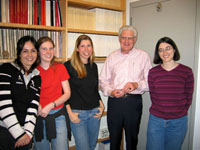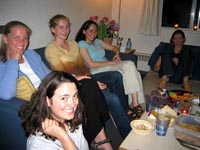Epilog
It seems fitting to close with a few results and comments that followed the workshop.
I wanted to let you know how much I enjoyed the workshop, and that I learned a great deal from the shared experiences. I have to confess that for me personally, it was a rather bipolar experience. On the one hand, I took away a lot of ideas which I will apply in my own group and with my colleagues. On the other hand, this same information brought to my mind with sharp contrast how as a junior faculty member at my "startup" EE department at Santa Cruz, I received really none of the help that a junior faculty needs. This has motivated me positively to try to make sure that the same does not happen to incoming new faculty or students. Shortly after the workshop, in fact, I contacted my Dean (Steve Kang) and shared my experiences with him and encouraged that the material from the workshop be brought to the attention of the department chairs and faculty - This has since happened. So you could certainly say that this workshop will have a direct effect on mentoring of students and faculty at UCSC's young School of Engineering.
On a personal note, I was very pleased to meet colleagues from around the country, and in particular so many successful women academics, who will serve as role models for my own two young daughters as they grow. It was a unique way for me to gain more perspective on the challenges and experiences ahead.
|
Peyman Milanfar |
|
UC Santa Cruz |
|
|
The PAESMEM workshop was really a great experience for me. As a PhD
student, I learned a lot from "Early and mid career mentoring
and support," especially Lydia and Sheila's talks, as well as the discussions
from the audience. They gave me a real idea about what the academic life
will be like for female faculty who are working hard for tenure in a
male-dominated area. The "Mentoring support" session the second day made
me realize that a lot of things could be done at Georgia Tech's College of
Computing to improve the opportunities for women students as my department
seems to be the one with the lowest female/male student ratio (even worse
than physics department)
and the department is trying very hard to attract female
undergraduate/graduate students and faculties. I have to admit that the
"Work/family issues" is the apex of the workshop in my personal view.
Every single presentation in this session draws a vivid picture of the
success story of a female faculty. I think every CS/EE female PhD student
should have an opportunity to watch the video of it if we had recorded it.
It conveys the message clearly that life is hard for a female faculty but
there is a way out. Choosing an academic life does not mean to sacrifice
personal life.
I did not realize the importance of "imposter syndrome" talk by Valerie
Young until I got back to Atlanta as I do not much believe in this
kind of talk. Just a few months ago I discussed with my MentorNet mentor
Elaine Weyuker about how men and women deal with unfair paper rejection
differently. Women tend to blame themselves even if they feel the negative
feedback is unjust. Elaine told me this to let me know not to be set back
by this kind of things. At this workshop Lydia also spoke out
from her experience that it is important not to take proposal rejection or
other negative feedbacks from others personally. Just go ahead to
do what you think is right for you. Valerie Young's presentation pointed
out that we can change the way we think and face the challenges more
confidently.
|
Yan Gu |
|
Georgia Tech PhD Student |
|
|
The PAESMEM workshop was very positive, encouraging and revealing.
Among all the topics of presentations and discussions, those regarding
mentoring of untenured faculty were extremely helpful to me.
They were pertinent to my own situation of feeling uninformed,
overwhelmed or sometimes frustrated: being told what needs to be done
without a hint of how they can be done. I could project those common
problems and difficulties that assistant faculty face in more objective
and general perspective. I believe that this apprehension would be the
first step toward finding positive solutions.
|
Yoonkyung Lee |
|
Ohio State Assistant Professor |
|
|
I really enjoyed the session on Mentoring Support -- because of all the resources mentioned
that I was not aware of previously. That in itself made this session very
informative. In particular, all the different databases that people can
enter themselves into for academic searches really caught my eyes.
I really enjoyed seeing the success stories of these programs and the
showcasing of the alumni and their accomplishments in academia. This
showed to me that the strategies espoused in these programs surely are
effective.
It was great to hear about the ADVANCE programs at different Universities.
This was the first time that I found out about their existence and all the
different levels of support that they provide.
|
Todd P. Coleman |
|
MIT Graduate Student |
|
|
There was little discussion at the workshop about the role that working
industrial scientists and engineers can play in mentoring students through
the degree process and into employment. Outside of MentorNet, it seems
that the Universities don't do much to exploit this resource. The irony
of it is that the majority of students will end up in industry, so it
would seem highly appropriate to work harder to partner students with
industry mentors. Perhaps the university alumni networks could be used as
an avenue to partner students with suitable mentors. Note that MentorNet
does a great job of this, but is largely aimed at women; it would be just
as appropriate for male students!
The session that reverberated most with us was "Mentoring support:
National and local resources for mentoring." It was encouraging to see how
much was being done especially for female graduate students, but it was
also a little disappointing in that many of us did not feel such support
at Stanford. Because of this, the group of women attending from EE at
Stanford has recently formed WEE (Women in Electrical Engineering,
wee.stanford.edu).
This year WEE plans to hold a pizza lunch monthly, with an invited speaker
to give students insight into various career paths of women with PhDs in
EE and related fields. We're organizing a big sister program for incoming
graduate EE women. Also, we're looking at statistics for various
milestones for men and women in the department to identify areas that may
need more attention.
We're very grateful for the ideas and inspiration we got at the PAESMEM
workshop; this has helped shape out new group significantly.
|
Deirdre O'Brien, Taly Gilat Schmidt, Viola Rieke, |
|
Hrefna Gunnarsdottir, Sarah Harriman |
|
Stanford University, PhD Candidates |
|
|


May 9, 2005










